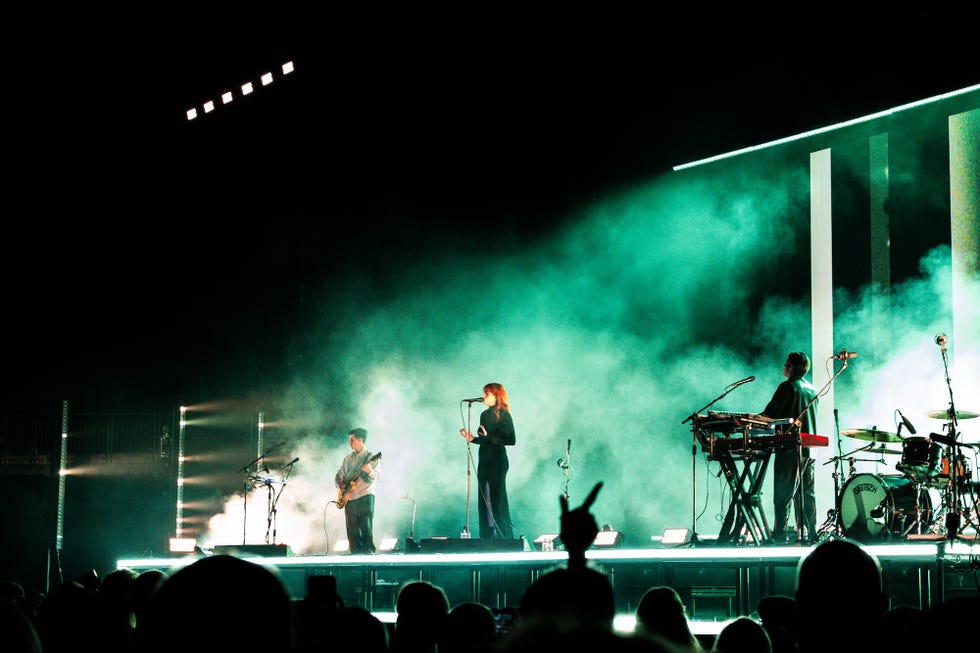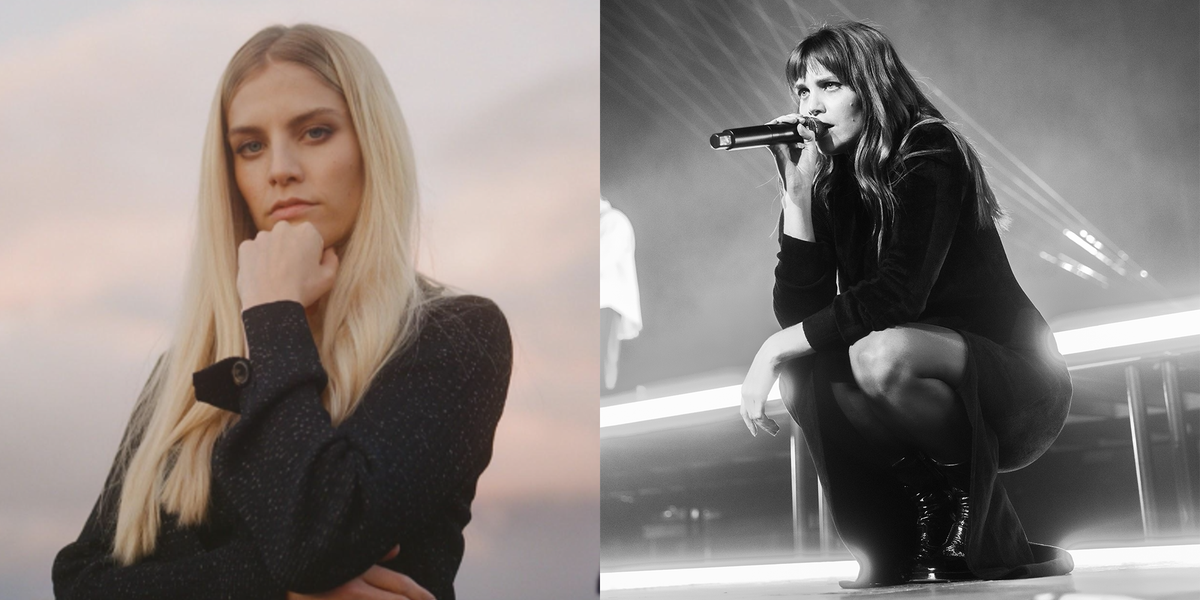I’ve been listening to London Grammar for more than a third of my life, since hearing them for the first time in 2013. Back then I was driving my grandma’s Rover 25 to a temping job on an industrial estate in Daventry, and the indie band fresh out of university had just released a breakout EP that would go on to shape their lives forever.
Twelve years later and London Grammar have navigated marriages, motherhood and creative differences to release four albums, gather the biggest crowd Glastonbury’s Park Stage has ever seen, and be announced as the closing headliner for the brand new LIDO Festival. As for me: the industrial estate is long gone but my music taste has stayed the same, growing up alongside the band, invisibly but inextricably connected as artist and listener. And now I’m talking to singer Hannah Reid about how we got here, reflecting on a decade of London Grammar, and what to expect for the next.
How does it feel reflecting on the past decade, and how the band’s journey has shaped your life during that time?
Hannah Reid: It’s quite strange: because of what I do for a living, you’re turning your life into art. So when you look back at what you’ve done, your life is reflected back. It’s kind of funny, because now if I sing Hey Now or Wasting My Young Years, those songs have a very different meaning to me now that I’m so much older.
What is kind of crazy is that we’re still here and still doing this for a living. That’s the thing that I am the most proud of: is just still having a career.
Why does that feel so unbelievable?
I’ve always really believed in our music, but the music industry is like the Wild West. I remember having such a vivid conversation with Dan (Rothman) when we released our first album, saying that Instagram was just a phase, and soon everyone would be onto the next thing. We wanted our record label to stop talking about it. And I could not have been more wrong: social media has completely changed the way we consume music. It does make me a little sad and concerned for the industry.
You’ve resisted becoming a band with a heavy social media presence, while it’s played an increasingly huge part in the industry for artists. Why is that?
I honestly just couldn’t do it if I wanted to. I think any time that I’ve tried to do anything like that, or chase that whole fame thing, it just doesn’t suit me as a person. It has been a challenge to not think that you need to do certain things. For some reason, we’ve managed to survive that, but there are lots of incredible artists that are really struggling.
The pressure to perform for social media is just one challenge in an industry that feels harsher than ever before, with touring also becoming increasingly expensive, and more venues closing. How are you navigating that?
It’s a big problem that artists are facing. We’re very lucky that we have a strong live following, so we can go on tours and know roughly the numbers and what we’ll make. But that means that we’re all under pressure to keep doing those tours, and it gets to a point where we wonder if it’s always going to be feasible for us to be able to do that in the future.
The thing that’s really not okay is that streaming platforms aren’t paying royalties to songwriters. At the end of the day, this is a business. You can’t just make art for free. We’re robbing the world of incredible art, because it’s so demotivating for people who are really talented, who feel there is no point in even trying to do this.

Dovetail
Against that difficult backdrop, it’s encouraging to see green shoots in the form of the brand new LIDO Festival, that you’re launching this summer as the closing headliner. What does that mean to you?
It kind of means everything to us, really. That’s what music is: when artists step foot on stage to play music live, that’s what the whole thing is about. I think that will be a big moment this summer.
This show comes almost exactly a year after you played to one of the biggest crowds Glastonbury’s Park Stage had ever seen. That must have been quite a surreal moment?
It’s kind of funny – because we don’t have that much of an online presence, I never really know what I’m in for. There really could be one person there waiting for us, or there could be 10,000. It was one of the best gigs we’ve ever played, and probably the highlight of my career as a singer because it just meant so much.
It was really overwhelming, in the best way possible. It’s cheesy to say, but I am really grateful for that emotional connection that I have with our fans. It doesn’t feel like it’s about me, Dan and Dot at all: it’s the people who really, really love the music.
Your audience isn’t the only one growing up together; you have as a band too, going from university mates to award-winning headliners. How have you navigated that?
To be completely honest, with enormous difficulty. Behind the scenes, both on the business and art side of things, we have been through quite a lot. I think most artists would have been through some stuff, but I think that with London Grammar there were some early formative experiences that weren’t great for us as a band.
I also think we’ve struggled slightly at times because often bands need to have a really strong identity: this is who you are as a group, this is who you are as a front woman, this is what you look like, this is what you stand for. But for us it’s always just been about the music and we’ve had to really push back against what other people thought that we ought to be or how we ought to be marketed.
What role has your relationships with each other played in how you evolved?
When you’ve got three people in a band who might have very different artistic visions, it is our friendship with each other that has carried us through. And although it sounds kind of cliche and cheesy, I think all three of us are really grateful for that, because that is actually quite a hard thing to achieve in a band. Lots of bands break up, and you can see why,
As well as evolving creatively, you’ve also all experienced major life changes like marriage and motherhood. Has that affected how you work together?
It really changes your artistic process, but we’re all now quite good at instinctively knowing how to put that first. When I was becoming a mum, Dan and Dot would go away and write a bunch of music, putting in that extra bit of passion if I wasn’t able to. I could then come back into the fold with more energy, and a bunch of songs. It does take dedication from three people to make that happen.
Has motherhood changed you as an artist?
It’s both a good thing and a difficult thing, as I realised that the nurturing energy that it takes to nurture a child comes from the same place as songwriting and creating. But it does impact my creative energy, so I’m just a little bit more picky about what I do and where I put my energy, which is probably a good thing. It’s given me a lot of freedom: I don’t get as nervous anymore.
You can definitely see that reflected in your performances now compared to earlier tours
I literally couldn’t speak to the audience when I was 24-25. I really suffered with that, and in interviews as well. I was really painfully shy and quite defensive. Now it’s a combination of just being more comfortable in your skin when you’re in your 30s and having been through some stuff – but there was something about motherhood that put everything into perspective.
Despite the nerves, do you hold any nostalgia for those earlier days?
Oh, my God, yes: so much. But I’m glad I’m not that person anymore. I’m glad that we are where we are now: we’re around really good people, and it’s a bit easier now. I’m a lot more at peace with myself and the industry.
Staying in the present, you posted on Instagram earlier this year that you’re working on album number five. Can you tell us anything about it?
I feel really excited about it. We’ve definitely gone back to our roots more, with the three of us in a room, lots of spontaneous songwriting, without a computer in sight.
What do you want people to take from London Grammar’s music, both old and new?
I hope that people come away feeling connected. I feel quite disconnected sometimes, and it is very easy to disappear behind a phone screen and feel really isolated from each other. I think music is an incredible way to create amazing memories with your friends and your family and feel connected to something bigger than yourself.
What do you hope for the next decade and beyond?
I think our priorities will probably change and we will disappear behind the music more and more. That’s kind of what I want to be honest: the three of us are very nerdy about music, and you can probably expect some off the wall records from us as we age. That’s my plan.
London Grammar headlines LIDO Festival on Sunday 15 June at Victoria Park. Tickets are available now at lidofestival.co.uk
